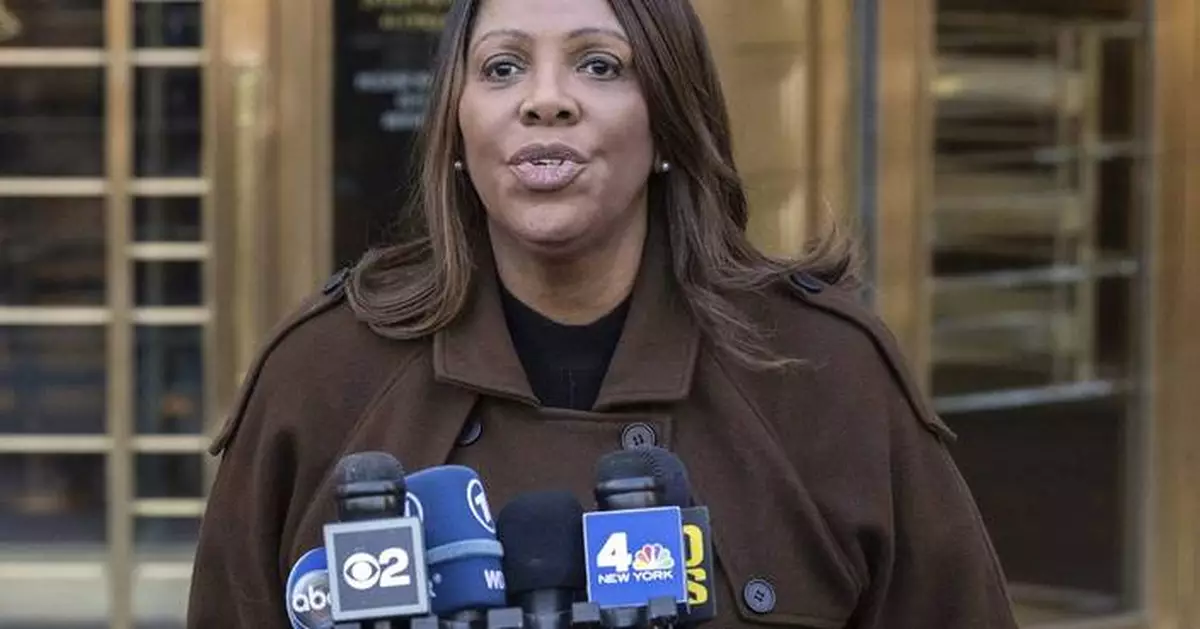NORFOLK, Va. (AP) — In the summer of 2023, New York Attorney General Letitia James helped her niece buy a modest house in Norfolk, Virginia, by becoming a co-borrower on the mortgage loan.
A top housing official in the Trump administration has now seized on a document in that transaction to argue that James should be prosecuted for bank fraud, asking the U.S. Justice Department in a letter to open a criminal investigation into the Democrat.
The request for an investigation comes as the administration has pursued a campaign of retribution against President Donald Trump's longtime foes in the legal world. James won a $454 million judgment against Trump last year in a lawsuit claiming he had lied about the value of his assets on financial statements given to banks.
James called the allegations against her “baseless."
“It is nothing more than a headline, nothing more than retaliation against all the actions I have taken successfully against Donald Trump," she said Wednesday in an interview on the New York cable news station NY1.
In an April 14 letter to Attorney General Pam Bondi asking for an investigation, U.S. Federal Housing Finance Agency Director William Pulte cited “media reports” claiming James had falsely listed a home in Virginia as her principal residence, which he hypothesized was an effort to avoid the higher interest rates people often pay for mortgages on second homes.
As evidence, Pulte cited a legal form James signed on Aug. 17, 2023, in which she gave her niece, Shamice Thompson-Hairston, the authority to sign documents on her behalf in connection with the sale two weeks later. Those forms are required when a person involved in buying a house can't be present for the closing.
That form included a line that says, “I hereby declare that I intend to occupy this property as my principal residence.”
“At the time of the 2023 Norfolk, VA property purchase and mortgage, Ms. James was the siting Attorney General of New York and is required by law to have her primary residence in the state of New York — even though her mortgage applications list her intent to have the Norfolk, VA property as her primary home,” Pulte wrote in the letter asking for an investigation.
James' office, however, shared a partial copy of a loan application in which she appeared to disclose that she didn’t intend to live in Virginia.
On the application, James was asked the question, “Will you occupy the property as your primary residence?” She checked the box that said “no."
“Donald Trump’s weaponization of the federal government continues to careen out of control – and now they are using cherry-picked information to attack the Attorney General,” her office said in a statement.
On another part of the loan application, James indicated she was applying for joint credit with Thompson-Hairston, who intended to use the home as her primary residence. That kind of arrangement isn't uncommon between family members, such as when parents help their children buy a starter home.
Real estate lawyers who spoke to The Associated Press said it was difficult to tell, based on the limited number of documents available publicly, whether anything improper had taken place or whether James had tried to deceive anyone about where she intended to live. One Virginia lawyer told the AP he had never seen a power-of-attorney form before that had a reference to a primary residence.
Bondi said Wednesday in an interview on Fox News that her office would review Pulte's letter.
Pulte also accused James of lying about the number of apartments in a New York City town house she has owned since 2001.
Pulte's letter cited a certificate of occupancy issued to a previous owner authorizing up to five living units in the Brooklyn building, where James lives and has rented apartments to some tenants. Multiple other city records indicate that the town house has four units.
James has indicated in building permit applications and in mortgage documents for years that the building has four units. Past news articles about the building have also referred to it as having four units.
Pulte speculated that James had misrepresented the number of units in order to qualify for federally backed mortgages offering interest rates unavailable to the owners of buildings with more than four units.
Experts in New York real estate said discrepancies about the number of units in a building aren't uncommon when property changes hands and typically only draw scrutiny from regulators when the change allows an owner to reap some improper advantage, such as skirting rent regulations.
“For regulatory and income-generating purposes, going from five units to four units doesn’t really help her,” said Andrew Scherer, a professor at New York Law School focused on housing law. “It seems highly unlikely that this kind of a difference would in and of itself be legally consequential.”
James' office said the building has four units and noted that the certificate of occupancy listing it as having five predated her ownership.
Beginning in July 2023, shortly before the start of Trump’s civil fraud trial, the city's Department of Buildings began receiving anonymous complaints claiming James had illegally misclassified the property.
“Why is she NOT being prosecuted for fraud and filling false documents when other people have been persecuted for far less crimes,” one complaint read.
Inspectors with the city’s Department of Buildings have found no violations. During their most recent visit on Wednesday, an inspection report determined the complaint was “unsubstantiated based on department records.”
Trump’s lawyers have appealed the judgment that James won against him. The president says he didn’t mislead anyone about the value of his properties.
Sisak and Offenhartz reported from New York.

FILE - New York Attorney General Letitia James speaks during a news conference outside Manhattan federal court in New York on Friday, Feb. 14, 2025. (AP Photo/Yuki Iwamura, File)
WASHINGTON (AP) — In a massive setback, House Republicans failed Friday to push their big package of tax breaks and spending cuts through the Budget Committee, as a handful of conservatives joined all Democrats in a stunning vote against it.
The hard-right lawmakers are insisting on steeper spending cuts to Medicaid and the Biden-era green energy tax breaks, among other changes, before they will give their support to President Donald Trump's "beautiful” bill. They warn the tax cuts alone would pile onto the nation's $36 trillion debt.
The failed vote, 16-21, stalls, for now, House Speaker Mike Johnson's push to have the package approved next week. But the holdout lawmakers vowed to stay all weekend to negotiate changes as the Republican president is returning to Washington from the Middle East.
“Something needs to change or you’re not going to get my support,” said Rep. Chip Roy, R-Texas.
Tallying a whopping 1,116 pages, the One Big Beautiful Bill Act, named with a nod to Trump, is teetering at a critical moment.
The conservatives are holding out for steeper cuts while GOP lawmakers from high-tax states including New York are demanding a deeper tax deduction, known as SALT, for their constituents. Johnson, with few votes to spare from his slim majority, has insisted Republicans will are on track with the sprawling package that he believes will inject a dose of stability into a wavering economy.
Ahead of Friday's vote, Trump had implored his party to fall in line.
“Republicans MUST UNITE behind, ‘THE ONE, BIG BEAUTIFUL BILL!’” the president posted on social media. "We don’t need ‘GRANDSTANDERS’ in the Republican Party. STOP TALKING, AND GET IT DONE!”
Democrats slammed the package as a “big, bad bill," or as Rep. Pramila Jayapal, D-Wash., called it, “one big, beautiful betrayal.”
They emphasized that millions of people would lose their health coverage and food stamps assistance if the bill passes while the wealthiest Americans would reap enormous tax cuts. They also said it would increase future deficits.
“That is bad economics. It is unconscionable,” said Rep. Brendan Boyle, the top Democratic lawmaker on the panel.
The Budget panel is one of the final stops before the package is sent to the full House floor for a vote, which is expected as soon as next week. Typically, the job of the Budget Committee is more administrative as it compiles the work of 11 committees that drew up various parts of the big bill.
But Friday's meeting proved momentous even before the votes were tallied. The conservatives, many from the Freedom Caucus, had been warning they would block the bill, using their leverage to demand further changes. Republicans hold a slim majority in the House and have just a few votes to spare to advance the measure.
Four Republican conservatives initially voted against the package — Roy and Reps. Ralph Norman of South Carolina, Josh Brecheen of Oklahoma, Rep. Andrew Clyde of Georgia. Then one, Rep. Lloyd Smucker of Pennsylvania, switched his vote to no.
“Sadly,” Norman said, “I’m a hard no until we get this ironed out.”
In their push for deeper spending reductions, the conservatives are particularly eyeing Medicaid, the health care program for some 70 million Americans. They want new work requirements for aid recipients to start immediately, rather than on Jan. 1, 2029, as the package proposes.
Smucker said afterward he was confident “we’re going to get this done.”
At the same time, the New Yorkers have been unrelenting in their demand for a much larger SALT deduction than what is proposed in the bill, which could send the overall cost of the package skyrocketing. Those talks are also underway.
As it stands, the bill proposes tripling what's currently a $10,000 cap on the state and local tax deduction, increasing it to $30,000 for joint filers with incomes up to $400,000 a year.
Rep. Nick LaLota, one of the New York lawmakers leading the SALT effort, said they have proposed a deduction of $62,000 for single filers and $124,000 for joint filers.
The conservatives and the New Yorkers are at odds, each jockeying for their priorities as Johnson labors to keep the package on track to pass the House by Memorial Day and then onto the Senate.
At its core, the sprawling package extends the existing income tax cuts that were approved during Trump's first term, in 2017, and adds new ones that the president campaigned on in 2024, including no taxes on tips, overtime pay and some auto loans.
It increases some tax breaks for middle-income earners, including a bolstered standard deduction of $32,000 for joint filers and a temporary $500 boost to the child tax credit, bringing it to $2,500.
It also provides an infusion of $350 billion for Trump’s deportation agenda and to bolster the Pentagon.
To offset more than $5 million in lost revenue, the package proposes rolling back other tax breaks, namely the green energy tax credits approved as part of President Joe Biden's Inflation Reduction Act. Some conservatives want those to end immediately.
The package also seeks to cover the costs by slashing more than $1 trillion from health care and food assistance programs over the course of a decade, in part by imposing work requirements on able-bodied adults.
Certain Medicaid recipients would need to engage in 80 hours a month of work or other community options to receive health care. Older Americans receiving food aid through the Supplemental Nutrition Assistance Program, known as SNAP, would also see the program's current work requirement for able-bodied participants without dependents extended to include those ages 55-64. States would also be required to shoulder a greater share of the program's cost.
The nonpartisan Congressional Budget Office estimates at least 7.6 million fewer people with health insurance and about 3 million a month fewer SNAP recipients with the changes.
Associated Press writer Leah Askarinam contributed to this report.

FILE - Speaker of the House Mike Johnson, R-La., joined from left by House Majority Whip Tom Emmer, R-Minn., and House Majority Leader Steve Scalise, R-La., talks to reporters at the Capitol in Washington, April 8, 2025. (AP Photo/J. Scott Applewhite, File)

FiLE - Speaker of the House Mike Johnson, R-La., speaks during a news conference at the Capitol, May 6, 2025, in Washington. (AP Photo/Rod Lamkey, Jr., File)

FILE - Speaker of the House Mike Johnson, R-La., talks to reporters just after House Republicans narrowly approved their budget framework, at the Capitol in Washington, April 10, 2025. (AP Photo/J. Scott Applewhite, File)

Speaker of the House Mike Johnson, R-La., left, House Small Business Committee Chairman Roger Williams, R-Texas, center, and House Majority Whip Tom Emmer, R-Minn., right, depart a news conference at the Capitol, Tuesday, May 6, 2025, in Washington. (AP Photo/Rod Lamkey, Jr.)

FILE - Speaker of the House Mike Johnson, R-La., joined from left by House Majority Whip Tom Emmer, R-Minn., and House Majority Leader Steve Scalise, R-La., talks to reporters about his push for a House-Senate compromise budget resolution to advance President Donald Trump's agenda, even with opposition from hard-line conservative Republicans, at the Capitol in Washington, April 8, 2025. (AP Photo/J. Scott Applewhite, File)

Speaker of the House Mike Johnson, R-La., speaks during a news conference at the Capitol, Tuesday, May 6, 2025, in Washington. (AP Photo/Rod Lamkey, Jr.)



























































